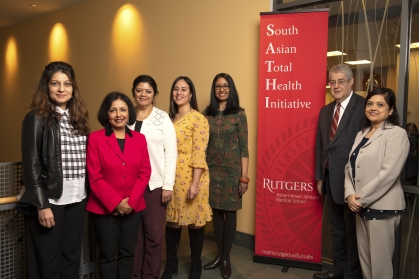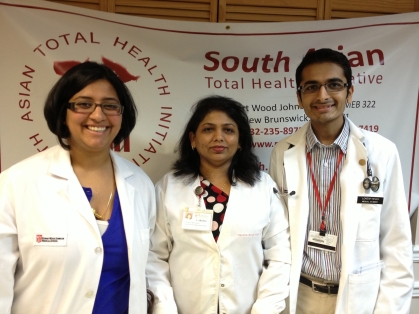Our Accomplishments
The South Asian Total Health Initiative was established at the Robert Wood Johnson Medical School with a mission to improve health outcomes in South Asians living in the United States. Nearly 5.4 million South Asians (people from Bangladesh, Bhutan, India, the Maldives, Nepal, Pakistan, and Sri Lanka) live in the US, representing the second fastest growing ethnic group in the nation. New Jersey has the third largest population of South Asians in the US, and Middlesex County has the largest population in the state.
South Asians are one of the highest risk groups for atherosclerotic cardiovascular disease and have higher hospitalization and mortality rates from it. In addition, South Asians have a two-fold higher prevalence of Type 2 Diabetes and insulin resistance compared to non-Hispanic whites in the US. They also have a disproportionately high prevalence of metabolic syndrome. South Asians born in the US show evidence of an altered metabolic profile even in young adulthood compared with young adults of European descent.
SATHI serves as a platform to engage multidisciplinary professionals such as researchers, health practitioners, and public health experts in promoting research, education and outreach to improve the health of this community. Since its founding in 2008, SATHI has expanded participation in our work across Rutgers, including the School of Public Health, Ernest Mario School of Pharmacy, Rutgers New Jersey Agricultural Experiment Station Cooperative Extension, the School of Arts and Sciences' South Asian Studies Program, and the Rutgers Cancer Institute of New Jersey. Over the years, SATHI has built a strong interest among faculty, students, and residents in the study and understanding of South Asian health.
Highlights
- Completed 11 community-based research projects, resulting in several scholarly publications
- Organized two groundbreaking continuing medical education conferences
- Organized seven Global Crossroads scholarly seminars
- Secured over $400,000 in external funding
- Collaborations with over 15 community-based partners
- Collaborations with Albert Einstein School of Medicine and Northwestern School of Medicine
- Multimodal community-based health outreach through health fairs, temple, and South Asian radio
- Awards, including:
- NJ BIZ Health Care Heroes finalist, 2009
- Proclamation from the New Jersey State Assembly for conducting the “Addressing Health Disparities and Health Literacy in the South Asian Community” Conference, October 2010
- Global Organization of People of Indian Origin Health Council award recipient for making a difference in the South Asian community through charity care/social service, 2010
Our Team

Leadership

Sunanda Gaur, MD
Professor of Pediatrics, Director, Adult and Pediatric Clinical Research Centers, and Director, SATHI
Phone732-235-7894
Emailgaursu@rutgers.edu

Usha Ramachandran, MD, FAAP
Accordion Content
-
Upendra Chivukula
Upendra Chivukula was one of the founding members of SATHI while he was in the New Jersey assembly, serving as the inspiration and the catalyst behind the formation of the initiative. He is an electrical engineer by profession and served as an elected officer for 18 years—as a councilman, mayor, and assemblyman. Subsequently, he served as public utilities commissioner. Mr. Chivukula remains active with SATHI as an advisor and a mentor to medical students involved in community projects related to the local South Asian community.
Kitaw Dimisse, MD, PhD
Kitaw Dimisse is dean and professor of the School of Public Health at SUNY Downstate Medical Center. Dr. Demissie has a strong track record of NIH-funded research in the areas of social and biological determinants of perinatal, respiratory and cancer outcomes.Dr. Demissie has led courses at the national level and was a recipient of several excellence teaching awards and was a member of the Stuart D. Cook, MD Master Educator’s Guild. Dr. Demissie is a recognized investigator in molecular epidemiology, cancer disparities, cancer prevention and control and population sciences with a diverse funding portfolio, including NIH/NCI, the American Cancer Society, Susan G. Komen Foundation and others.
Sneha Jacob, MD, MSSneha Jacob is an associate professor of medicine and serves as director of HIV clinical services at the Eric B. Chandler Health Center. She completed a primary care internal medicine program at Johns Hopkins University and an HIV clinical fellowship as well as a master of science in epidemiology at Columbia University. In 2013 she developed an infectious disease outreach project for SATHI (SATHI-IDO). In recognition of her work with SATHI, the US Office of Minority Health funded her proposal for SATHI-IDO to lead a health information campaign to increase HIV awareness among Asians in Central New Jersey.
Pravien Khanna, MD, MPH
Pravien Khanna is an interventional cardiologist practicing at RWJBarnabas Health and St. Peter’s University Hospital. Dr. Khanna received his medical and public health degrees from Columbia University. He completed his post-graduate residency in internal medicine and fellowship in dardiovascular disease from Yale University School of Medicine. He then received additional fellowship training in interventional cardiology from Weill Cornell Medical Center. Dr. Khanna specializes in cardiac and peripheral interventions. He has published in areas interventional cardiology, heart failure, and nuclear cardiology. His current research interest includes the prevention and management of coronary artery disease in South Asians.
Robert Like, MD, MS
Robert Like is emeritus professor of family medicine and community health at Robert Wood Johnson Medical School, and founder and CEO of JEDI Health Care and Education, LLC. A medical anthropologist by training, Dr. Like is renowned in the field of health disparity and inequity and delivery of culturally competent care at all levels. He provides technical assistance and consultation related to the delivery of patient- and family-centered, culturally responsive care to diverse populations by clinicians, health care organizations, and academic medical centers.
Shailja Mathur, MS, M, Ed, RDNShailja Mathur is an assistant professor and educator in the Rutgers Department of Family and Community Health Sciences. She has been in the field of dietetics for over two decades. She has provided leadership to nutrition education outreach projects on behalf of Rutgers Cooperative Extension at the national, state, and county level since 2001. She served as the division chair for the Social Marketing Division of the Society of Nutrition Education and Behavior for several years. On the national front, she served as the co-chair of the Association of SNAP Nutrition Education Administrators from 2013-2015. She teaches online leadership classes and serves on the advisory committee for the Sodexo Internship Program.
Lakshmi Nandini Moorthy, MD (MBBS), MS
Lakshmi Nandini Moorthy is professor of pediatrics and chief of the Division of Pediatric Rheumatology at Robert Wood Johnson Medical School. In addition to seeing an array of complex patients, Dr. Moorthy is also involved in education and research. She qualitatively explored the impact of lupus on health-related quality of life of children and parents, and developed and validated the Simple Measure of the Impact of Lupus Erythematosus in Youngsters (SMILEY©) through a multicenter study. She has been a recipient several awards and grants. She has completed a grant on improving lupus awareness funded by the US Department of Health and Human Services, Office of Minority Health and was then awarded a grant to determine the biopsychosocial determinants of health in the context of the COVID-19 pandemic in immunosuppressed children. Subsequently, she was awarded a New Jersey Health Foundation grant on improving COVID awareness among patients, parents, and caregivers. She has a stellar record of successful and productive research projects in areas of high relevance for vulnerable pediatric populations. Most recently, she has collaborated with SATHI on projects related on mental health in South Asian youth.
Partho P. Sengupta, MD, MBBS, FACC
Partho P. Sengupta is the Henry Rutgers Professor and the Chief, Division of Cardiovascular Disease and Hypertension at Robert Wood Johnson Medical School and the Robert Wood Johnson University Hospital. He has over 300 peer-reviewed publications that have focused both on novel cardiac imaging and digital health technologies that include AI, robotics, and wearables. He has led multidisciplinary teams of engineers, imagers, and data scientists to create technological innovations that are supported by Industry-sponsored grants and the National Science Foundation. He is an Associate Editor for the Journal of American College of Cardiology for Cardiovascular Imaging and has served as a Board of Director for the American Society of Echocardiography (ASE). He has won several excellence awards with the most recent being the 2023 distinguished Gifted Educator Award from the American College of Cardiology (ACC).
Varsha Singh DNP, APN, CT-CP, NEA-BC, FAHA, FAANP
Varsha Singh is a neuroscience/stroke program manager, an expert neuroscience nurse practitioner, as well as a subject matter expert on stroke program accreditation/management. She has presented at local, national, and international nurse practitioner conferences and at the World Stroke Congress. She currently serves as part of the New Jersey Department of Health’s Stroke Care Advisory Panel, the communication subgroup of the International Council of Nurses NP/APN Network, education committee of American Neurovascular Clinicians, membership committee of the World Stroke Organization, is vice chair of Jonas Scholars Alumni Council, and is a Nurse Champion for Climate Change. She is “Community Stroke Educator” for the South Asian community.
Naveena Yanamala, MS, PhD
Naveena Yanamala is an Associate Professor of Medicine and Director of Data Science and Machine Learning Research at Robert Wood Johnson Medical School. Additionally, she directs the Center for Innovation at RWJUH, serves as Editorial Board Member for the American Society of Echocardiography (ASE), and holds roles as Associate Editor for Translational Systems Biology and In Silico Trials. She was recently appointed to serve as a Special Government Employee on the Patient Engagement Advisory Committee for the Center for Devices and Radiological Health (CDRH) at the US FDA and holds academic affiliations as an Associate member of the BME Graduate Program at Rutgers University and Adjunct Faculty at Carnegie Mellon University. With over 15 years of interdisciplinary research experience, Dr. Yanamala has authored over 80 peer-reviewed articles at the nexus of biology, health, and computation. Her research has been dedicated to advancing science and healthcare through applied ML/AI methodologies, primarily focusing on critical challenges in medicine and public health. Some of her notable recognitions include winning the NIH NIHLBI Big Data Analysis Challenge in 2020, as well as prestigious awards from CDC/NIOSH, such as the Alice Hamilton Award and the Charles C. Shephard Science Award.
Contact Us
South Asian Total Health Initiative
Robert Wood Johnson Medical School
Division of Allergy, Immunology, and Infectious Diseases
89 French Street, PCRC
New Brunswick, NJ 08901
Phone: 732-235-6132
Fax: 732-235- 9060
Hours: Monday–Friday, 8:30 a.m.–4:30 p.m.
Email: gaursu@rwjms.rutgers.edu
Community Based Projects & Research
South Asian Youth Mental Health Project (2022–Ongoing)
A Culture-Centered Approach to Assessing the Mental Health Needs of Adolescents and Young Adults of South Asian Descent
This community-engaged project aims to develop and implement a community-driven intervention that addresses the mental health concerns of adolescents and young adults (AYAs) of South Asian (SA) descent who face unique mental health challenges including the stress of acculturation, mental health stigmatization, expectations to be model students, and underutilization of mental health services. We adopt a Culture-Centered Approach and utilize concept mapping to represent SA AYA voices and cultural experiences, to identify distinctive challenges, and implement community-generated solutions. Investigating mental health challenges and community driven solutions is crucial for understanding their challengesthat are often overlooked when only commonly-accepted measures are employed.
Project Team: Lisa Mikesell, Usha Ramachandran, Nandini Moorthy, Varsha Singh, Sunanda Gaur
Cultural Competence Trainings (2013–Ongoing)
Cultural competence in healthcare is the method by which healthcare systems can show cultural sensitivity toward patients with different cultural faith, values, beliefs, and behaviors. SATHI offers workshops for healthcare professionals emphasizing awareness of South Asian cultural and health related beliefs. The sessions are conducted using interactive case studies.
SATHI-SEHAT Project (2017-2018)

The SATHI-SEHAT initiative was an evidence-based nutrition and lifestyle education program focused on making transformational changes in the health status of those who attend temple based devotional and community health events. Under the umbrella of SATHI-SEHAT, we engaged with local Hindu temples that are the home of spiritual health and fitness to become active centers for information on improving healthy food choices and physical activity.
Project Team: Sunanda Gaur, Shailja Mathur, Bishakha Ghoshal, Varsha Singh, Manisha Bajpai, Vanessa Rios
Latent Tuberculosis Project (2017-2019)
SATHI collaborated with the Children’s Hospital at Saint Peter's University Hospital (SPUH), the Middlesex Department of Health (DOH) and the Rutgers Global Tuberculosis Institute (RGTI) on a Latent Tuberculosis project. This project had two main objectives. Firstly, to educate the lay South Asian community living in Middlesex, Mercer and Somerset counties on the importance of screening and treating Latent Tuberculosis infection (LTBI). Secondly to educate primary care physicians regarding risks of TB in the South Asian community and the need for TB testing to diagnose and treat LTBI. The first phase of this project which was a community survey regarding TB knowledge and attitudes regarding testing and treatment of LTBI, completed in 2018. Second phase was the development and implementation an educational intervention to improve TB testing rates in this community.
Project Team: Sabah Kalyoussef, Sunanda Gaur, Kristina Feja, Amisha Malhotra, Navaneeth Narayanan, Bishakha Ghoshal, Nupur Gulati, Rajita Bhavaraju, Arpita Jindani, Marybeth Caruso
Publications:
- J Community Health. 2018 Dec 17. PMID: 30560311
- Open Forum Infect Dis. 2019 Oct; 6 (Suppl 2): S499–S500
IDO Project (2013-2016)

In the Infectious Disease Outreach (IDO) Project, SATHI conducted a brief survey on the knowledge and attitudes of South Asians towards HIV/AIDS. HIV testing rates among South Asians, both nationally and in NJ, remain much lower than expected based on demographic figures. Early diagnosis of HIV through routine testing is the best strategy to achieve optimal outcomes for HIV infected individuals.
Sneha Jacob, a faculty member at Rutgers and director of the HIV program at the Eric B. Chandler Health Clinic in New Brunswick, led the study. The study consisted of two surveys: one for South Asian community members and the other for health care providers of South Asian origin. The surveys were conducted at various South Asian health fairs in NJ and South Asian cultural events as well.
Project Team: Sunanda Gaur, Sunpreet Singh, Shreedevi Shukla, Devangi Shukla, medical students from the American Association of Physicians of India chapter
CHALO Project (2016-2022)
SATHI worked with the Albert Einstein College of Medicine on the CHALO project, which has been funded by the NIH-NIMHHD. CHALO (Child Health Action to Lower Obesity and Oral Health risk) was a multi-level strategy aimed at reducing pediatric obesity and dental caries risk in South Asian (SA) children. Although SA children are at high risk for both obesity and dental caries, there has been very little research in this population. CHALO aims to address that need. It involved three steps: a mixed methods descriptive study of SA child health risks, a randomized controlled trial (RCT) of an educational program aimed at reducing risk behavior, and a knowledge translation project which will share data from the descriptive and RCT arms of the project with the SA community, health professionals and other stakeholders in order to raise awareness regarding risks for obesity and caries in SA children.
Project Team: Usha Ramachandran, Allison Karasz,Sunanda Gaur, Bishakha Ghoshal
Publication: Clin Pediatr (Phila). 2022;99228221143306. doi:10.1177/00099228221143306 PMID: 36482667
Project SAHAS (2013-2018)
A culturally tailored stroke prevention program for South Asian communities funded by the New Jersey Office of Minority and Multicultural Health. SATHI developed and implemented Project SAHAS (South Asian Health Awareness about Stroke) for the South Asian community residing in Central New Jersey. Stroke prevention education was conducted in settings that were easily accessible to the South Asian community. The curriculum was delivered in the two most commonly spoken languages, Hindi and Gujarati. Based on the results of the project, a revised curriculum was developed and named SAHAS (South Asian Health Awareness about Stroke). In this five-year long project, which was completed in June 2018, we enrolled over 500 participants. In addition, we developed a “Stroke Talker” program in which Rutgers University students were trained to become “stroke talkers” to continue to spread the message of stroke prevention and early action within the South Asian community.
Project Team: Varsha Singh, Shailja Mathur, Bishakha Ghoshal, Sunanda Gaur
Publication: Journal of Immigrant and Minority Health. August 2020. PMID: 32813225 DOI: 10.1007/s10903-020-01071-w
Global Crossroads (2013-2017)
Seminars on South Asian Culture, Ecology and Health
The Global Crossroads Seminar Series was established in 2013. These yearly seminars organized by SATHI serve as a medium to bring together researchers, public health professional, medical professional, and the community to discuss the most pressing health issues facing South Asian community living in the US.
Seminars:
- Identity, Culture and Cardiovascular Disease Prevention in the South Asian Diaspora, November 4, 2013. Speaker: Namratha Kandula
- What is Health, What is Illness? Global and Local Forms of World-Making, April 14, 2014. Speaker: Veena Das
- Stroke in Minority Communities: Partnership for Prevention, April 23, 2014. Speakers: James McKinney, Gaurav Gupta, and Varsha Singh
- Improving Mental Health in South Asian Communities: Interfacing Global and Local Approaches, April 1, 2015. Speaker: Alison Karasz
- H.E.A.L.: Holistic Care and Empowerment of Youth & Adults with Lupus, April 19, 2016. Speaker: L. Nandini Moorthy
- Breaking Barriers: Raising HIV Awareness in South Asian Community, April 11, 2017. Speaker: Sneha Jacob
SATHI Projects
-
Year
Project
Funding
2008
Radio series on Disabilities in South Asians (EBC radio)
Christopher and Dana Reeves Foundation
2010
Conference: Addressing Health Disparities and Health Literacy Challenges in South Asian Community
RWJ Foundation; Verizon Foundation; Merck; Novartis
2010-2012
Community Needs Survey: Health Care Practices of the Foreign Born Asian Indians in the US
SATHI
2013-ongoing
Cultural Competence Training for Health Providers
SATHI
2014-2018
Joining Efforts in Enforcing Vitality and Nutrition (JEEVAN)
RWJ Medical Students Club
-
Year
Project
Funding
2013-2018
South Asian Health Awareness About Stroke (SAHAS)
NJ Office of Minority and Multicultural Health
2013
Conference: Identity, Culture and Cardiovascular Disease Prevention in South Asians
Rutgers Global
2009-2010
Chronic Disease Self Management Project
NJ Office of Minority and Multicultural Health
2014
Conference: Stroke in Minority Communities: Partnership for Prevention
Rutgers Global
2017-2018
SATHI-SEHAT: Temple-based nutritional intervention
NJ Healthy Communities Network
2019-ongoing
NJ Asian Cohort
IFH-RWJ Foundation
-
Year
Project
Funding
2007
Your Child & You radio series
RWJMS-Department of Pediatrics
2010-2013
Stay on Track nutrition video game
Novartis; American Association of Physicians of Indian Origin (AAPI)
2010-2011
Thalassemia outreach and education project for South Asians
New York Mid-Atlantic Consortium for Genetic and Newborn Screening
2013
Conference: Caring for South Asian Families - Maternal and Child Health Issues in Practice
March of Dimes; Novo Nordisk
2013-2015
Adverse Outcomes among South Asian Indian Births in NJ
Rutgers School of Public Health
2016-2022
CHALO (Child Health Action to Lower Obesity)
National Institute of Minority Health and Disparities; Albert Einstein School of Medicine
2017
Safe Sleep in Asian Indian Infants
State of NJ SIDS Registry
-
Year
Project
Funding
2013-2016
SATHI-Infectious Disease Outreach Project (HIV surveys)
NJ Department of Health
2017-2018
SATHI-HIV Health Information Campaign targeting South Asian Americans
Office of Minority Health Research Coordination
2014-2017
Travel Wisdom/Health Talker Project "Destination India"
CDC, Health Talker Inc.
2017-2019
Latent TB Outreach Project
SATHI, Rutgers Global TB Institute, St. Peters University Hospital
-
Year
Project
Funding
2012
Smokeless tobacco use in South Asians in NJ
National Cancer Institute
2014
Culturally adapted behavioral intervention to improve colorectal cancer screening
Cancer Institute of NJ
2015
Conference: Improving Mental Health In South Asian Communities
Rutgers Global
2021-Ongoing
A Culture-Centered Approach to Assessing the Mental Health Needs of Adolescents and Young Adults of South Asian Descent
Rutgers CTSA and Rutgers Research Council
Collaborations
- Rutgers Cancer Institute of New Jersey
- Albert Einstein College of Medicine
- King George Medical University, Lucknow, India
- American Association of Physicians of Indian Origin (AAPI)
- AAPI students at Robert Wood Johnson Medical School: Distinction in Service to the Community projects
- Rutgers Center for Healthy Families and Cultural Diversity
- Rutgers School of Public Health
- Rutgers South Asian Studies Program
- India Health Camps of NJ
- Agraj Seva Kendra
- South Asian Mental Health Awareness in Jersey (SAMHAJ)
- New Brunswick Public Library
- Robert Wood Johnson University Hospital (RWJUH) Community Outreach Program
- Department of Diversity and Inclusion at RWJUH
- Hindu American Seva Charities
- Sai Temple North Brunswick
- Durga Mandir Princeton
Publications
- Kalbag A, Ray-Chaudhary N, Ghai G, Mehrotra N, Rao J, Gaur S, Like R. Addressing Health Disparities and Health Literacy Challenges in the South Asian Community: Summary Report and Recommendations: 2011
- Mehrotra N, Gaur S, Petrova A. Health Care Practices of the Foreign Born Asian Indians in the US: A Community Based Survey. J Community Health: Journal of Community Health: Volume 37, Issue 2 (2012), Page 328-334
- Nita Ray-Chaudhuri, Ramya Krishnan, Sunanda Gaur. The SATHI Conference: Caring for South Asian Families. New Jersey Pediatrics: Winter 2013. Page 34-35
- Karen Kurtyka, Sunanda Gaur, Naveen Mehrotra, Sheenu Chandwani, Teresa Janevic, Kitaw Demissie. Adverse outcomes among Asian Indian Singleton Births in New Jersey, 2008-2011. Journal of Immigrant and Minority Health, 2015 Aug; 17(4):1138-45. PMID: 25047404
- Leng J, Peruluswami P, Bari S, Gaur S, Radparvar F, Parvez F, Chen Y, Flores C, Gany F. South Asian Health: Inflammation, Infection, Exposure, and the Human Microbiome. J Immigrant Minority Health (2017). PMID: 28952002
- Ostfeld B, Gaur S, Hegyi T. Safe Infant Sleep and Sudden Unexpected Infant Deaths in New Jersey Asian Indians. New Jersey Pediatrics. 2018;44-10-11
- Manne S, Islam N, Frederick S, Khan U, Gaur S, Khan A. Culturally-Adapted Behavioral Intervention to Improve Colorectal Cancer Screening Uptake Among Foreign-born South Asians in New Jersey: The Desi Sehat Trial. Ethnicity and health. 2018 Nov 4:1-17. PMID: 30394106
- Narayanan N, Gulati N, Ghoshal B, Feja K, Malhotra A , Bhavaraju R , Jindani A, Gaur S, Kalyoussef S. Latent Tuberculosis Infection Beliefs and Testing and Treatment Health Behaviors amongst Non-US-Born South Asians in New Jersey: A Cross-Sectional Community Survey. J Community Health. 2018 Dec 17. PMID: 30560311
- Visaria A, Dharamdasani T, Gaur S, Ghoshal B, Singh V, Mathur S, Varghese Demissie K. Effectiveness of a Cultural Stroke Prevention Program in the United States-South Asian Health Awareness About Stroke (SAHAS) Journal of Immigrant and Minority Health. August 2020. PMID: 32813225 DOI: 10.1007/s10903-020-01071-w
- Gulati N, Pentakota SR, Feja K, Ghoshal B, Bhavaraju R, Jindani A, Gaur S, Kalyoussef S. Physician Practice Patterns for Screening and Treatment of Latent Tuberculosis Infection in the South Asian Population in Central New Jersey. Open Forum Infect Dis. 2019 Oct; 6 (Suppl 2): S499–S500
- Rai S, Gaur S, Ramagopal M. Cultural Sensitivities and Pediatric Asthma Health Beliefs. Pages 26-29, NJ Pediatrics. Fall 2020
- Ramachandran U, Mahajan K, Shah A, Ghoshal B, Khurshid A, Desilva,N, Shiriti, M, Patel N, Gaur S, Karasz A. Challenges and Barriers to Providing Primary Care to Children of South Asian Origin: Pediatricians’ Perspectives. Clin Pediatr (Phila). 2022;99228221143306. doi:10.1177/00099228221143306 PMID: 36482667
Volunteer Opportunities
- SATHI-Infectious Disease Outreach Project
- Principal Investigator: Sneha Jacob
- Survey of South Asian community members and physicians regarding attitudes and behaviors related to HIV.
- Project SAHAS (South Asian Health Awareness about Stroke)
- Principal Investigator: Sunanda Gaur
- Global Crossroads: Seminars on South Asian Culture, Ecology, and Health
- Principal Investigator: Sunanda Gaur
- Evaluation of Birth Outcomes in South Asians
- Principal Investigator: Sheenu Chandwani
Get Involved
Interested in volunteering with SATHI? Contact Director Sunanda Gaur.
Community Resources
Accordion Content
The organizations listed below provide disability, domestic violence, health, mental health and human services for South Asian communities in New Jersey.
To add your organization to the list, please contact us with information regarding your programs and services.
-
ABCD: Alliance for the Betterment of Citizens with Disabilities
127 Route 206, Suite 18
Hamilton, New Jersey 08610
Phone: 609-581-8375
Fax: 609-581-8512
Website: www.abcdnj.org- Mission: The mission of ABCD is to affect the development and implementation of public policy and to support the member organizations whose specific purpose is to improve the lives of people with multiple physical and developmental disabilities so that they have the opportunity to attain the highest level of purpose and dignity.
- Programs & Services: Disability Advocacy, Technical Assistance, Educational Support, Analysis/Research Activities
The ARC of New Jersey
985 Livingston Avenue
North Brunswick, NJ 08902
Phone: 732-246-2525
Fax: 732-214-1834
Email: info@arc.org
Website: www.arcnj.org- Mission: The Arc of New Jersey is committed to enhancing the quality of life of children and adults with intellectual and developmental disabilities and their families, through advocacy, empowerment, education and prevention.
- Programs & Services: Education Advocacy, Family Advocacy, Public Affairs/ Communication, Governmental Affairs
Autism New Jersey Inc.
1450 Parkside Avenue, Suite 22
Ewing, NJ 08638
Phone: 609-588-8200
Helpline: 1-800-4-Autism
Fax: 609-588-8858
Email: information@autismnj.org
Website: www.njcosac.org- Mission: Autism New Jersey encourages responsible basic and applied research that may lessen the effects of, and potentially prevent, autism. It is dedicated to ensuring that all people with autism receive appropriate, effective services to maximize their growth potential and to enhancing the general public's overall awareness of autism.
- Programs & Services: Information, Advocacy, Family Education, Professional Education, Consultation
BIANJ: Brain Injury Association of New Jersey
825 Georges Road, Second Floor
North Brunswick, NJ 08902
Phone: 732-745-0200
Helpline: 800-669-4323
Fax: 732-745-0211
Email: info@bianj.org
Website: www.bianj.org- Mission: The mission of BIANJ is to support and advocate for individuals affected by brain injury and raise public awareness through education and prevention.
- Programs & Services: Information, Advocacy, Mentor Program, Family Support, Support Groups, Camps
Brighter Tomorrows
Website: https://www.lettercase.org/
- Mission: The mission of Brighter Tomorrows is to support families by providing information about Down syndrome.
- Programs & Services: Down syndrome education, Shared Stories, Information Sources
The Boggs Center on Developmental Disabilities
335 George St., Suite 3500
P.O. Box 2688
New Brunswick, NJ 08903-2688
Phone: 732-235-9300 or 732-235-9330
Website: https://boggscenter.rwjms.rutgers.edu/- Mission: The Elizabeth M. Boggs Center, as a University Center for Excellence in Developmental Disabilities, values uniqueness and individuality and promotes the self-determination and full participation of people with disabilities and their families in all aspects of community life.
- Programs & Services: Disability Assistance
Disability Rights New Jersey
210 South Broad Street, 3rd Floor
Trenton, New Jersey 08608
Phone (NJ Only): 1-800-922-7233
TTY: 609-633-7106
Website: https://disabilityrightsnj.org/- Mission: Disability Rights New Jersey serves as the protection and advocacy system for those with disabilities in New Jersey.
- Programs & Services: Client Assistance, Disability Assistance, Help in Obtaining Assistive Technology Devices, Mental Health Protection & Advocacy
Epilepsy Foundation New Jersey
1 AAA Drive, Suite 203
Trenton, NJ 08691
Phone: 800-336-5843
Fax: 609-392-5621
Website: https://epilepsyservicesnj.org/- Mission: The Epilepsy Foundation of New Jersey is dedicated to helping to improve the quality of life for people affected by epilepsy and their loved ones. It will ensure that people with seizures are able to participate in all life experiences.
- Programs & Services: Research, Advocacy, Education, Camps, Support Groups
-
South Asian Mental Health Awareness in Jersey
National Alliance on Mental Illness in New Jersey
1562 Route 130
North Brunswick, NJ 08902
Phone: 732-940-0991
Fax: 732-940-0355
Helpline: 866-NAMI-IFSS
E-mail: info@naminj.org
Website: www.naminj.org- Mission: South Asian Mental Health Awareness in Jersey is a program from the National Alliance on Mental Illness in New Jersey that provides support and education for South Asian individuals and families affected by mental illness in New Jersey.
- Programs & Services: Health Education, Mental Health, Referral Service
South Asian Mental Health Initiative & Network (SAMHIN)
812 North Wood Avenue, Suite 102
Linden NJ 07036-4058
Phone: 732-902-2561
Website: https://samhin.org/SAMHIN -
Manavi, Inc.
PO Box 3103
New Brunswick, NJ 08903
Phone: 732-435-1414
Fax: 732-435-1411
E-mail: manavi@manavi.org
Website: www.manavi.org- Mission: Manavi's mission is to end all forms of violence against women. Manavi hopes to achieve this by bringing about social change as well as by assisting women in their attempts to end the cycle of abuse in their lives and progress towards self-reliance and autonomy.
- Program & Services: Advocacy, Domestic Violence, Volunteer Opportunities, Counseling, Legal Clinics, Referrals, Support Groups, Transitional/Safe House, Interpretation/Translation Services
NJ Coalition Against Sexual Assault
2333 Whitehorse Mercerville Road, Suite J
Trenton, New Jersey 08619
Phone: 609-631-4450
Helpline: 1-800-601-7200
Fax: 609-631-4453
Website: www.njcasa.org- Mission: The mission of the New Jersey Coalition Against Sexual Assault is to promote the compassionate and just treatment of survivors, their loved ones and significant others, foster collaborative relationships between community systems, and affect attitudinal and behavioral changes in society as we work toward the elimination of sexual violence against all people.
- Programs & Services: Education, Assistance, Support Groups, Counseling, Referrals, Crisis Intervention, Accompaniment to Court, Hospital, or Police Station
Women Against Family Abuse House Inc.
PO Box 2101
Clifton, NJ 07015-2102
Phone: 973-278-6229
Helpline: 1-800-930-WAFA
E-mail: info@wafahouse.org
Website: www.wafahouse.org- Mission: The mission of WAFA House is to assist and educate any victims of domestic violence by establishing and maintaining a facility, which will empower and enrich the family unit, as well as provide a variety of services to the individuals.
- Program & Services: Advocacy, Child Abuse, Conflict Resolution/Mediation, Counseling, Crisis Hotline, Domestic Violence, Legal Assistance, Mental Health, Referral Service, Tutoring, Volunteer Opportunities
-
Carol G. Simon Cancer Center at Morristown Medical Center
Cancer Grant Office, Box 18
100 Madison Ave.
Morristown, NJ 07962
Phone: 973-971-5952 or 973-971-6581
E-mail: jigisha.kothari@ahsys.org
Website: https://www.atlantichealth.org/conditions-treatments/cancer-care.html- Mission: The mission of the Cancer Screening Program at Morristown Medical Center is to reach out to the South Asian community through New Jersey Cancer Education and Early Detection Program (NJCEED) and Susan G. Komen Foundation's grant and support to education and screen the community for early detection of breast, cervical, colorectal, and prostate cancer.
- Programs & Services: Cancer, Community Outreach, Health Education, Health Screening Services
Diabetes Foundation Inc.
13 Sunflower Avenue
Paramus, NJ 07652
Phone: 800-633-3160 or 201-444-0337
Email: info@diabetesfoundationinc.org
Website: www.diabetesinnj.org- Mission: Diabetes Foundation, Inc. focuses its efforts to improve the quality of life for people with diabetes.
- Programs & Services: Public Education, Professional Education, Diabetic Children's Camp Scholarships, Medication Assistance, Supplies Assistance
-
South Asian Marrow Association of Recruiters
55-13 96th Street
Corona, NY 11368
Phone: 718-592-0821
Email: samar@samarinfo.org
Website: www.samarinfo.org- Mission: To develop an informed society that is motivated to address the marrow/stem cell transplant needs of those suffering from life-threatening blood disorders among various under represented minority communities with focus on South Asians.
- Programs & Services: Advocacy, Cancer, Community Outreach, Health Education, Support Groups, Volunteer Opportunities
-
Visiting Nurse Association
176 Riverside Ave.
Red Bank, NJ 07701
Phone: 1-800-VNA-3330
Website: https://vnahg.org/- Mission: The Visiting Nurse Association is a voluntary, non-profit organization dedicated to the promotion, restoration, and maintenance of the health status of individuals and the community.
- Programs & Services: Health Care Services, Health Education, Health Screening Services, HIV/AIDS and Sexual Health, Home Health Care, Nutrition/Meal/Food Programs, Public Health Promotions, Support Groups, Volunteer Opportunities
-
Community Health Law Project
185 Valley Road
South Orange, NJ 07079
Phone: 973-275-1175
Fax: 973-275-5210
Hearing Impaired: 973-275-1721
Email: chlpinfo@chlp.org
Website: www.chlp.org- Mission: The mission of the Community Health Law Project is to provide legal services for individuals with disabilities or for organizations representing individuals with disabilities, particularly for those considered needy or vulnerable.
- Programs & Services: Disability Advocacy, Legal Services
New Jersey Community Development Corp.
32 Spruce St.
Paterson, NJ 07501
Phone: 973-413-1600
Fax: 973-413-1640
E-mail: info@njcdc.org
Website: www.njcdc.org- Mission: United Community Development Corporation of New Jersey, Inc. is a community-based, non-profit organization founded to advocate for equal opportunities for disadvantaged, low-income minority, and immigrant communities throughout the state of New Jersey.
- Programs & Services: Advocacy, Cancer, Civil Rights, Community Organizing, Economic Empowerment, Government Assistance, Immigration/Citizenship Services
NJ Family Care
PO Box 8548
Trenton, NJ 08625
Phone; 1-800-701-0710
Spanish: 1-800-356-1561
Website: www.njfamilycare.org
Hearing Impaired: 1-800-701-0720- Mission: To provide free or low-cost comprehensive health coverage to uninsured children and certain low-income parents who cannot afford the cost of private or employer sponsored insurance.
- Programs & Services: Benefits/Entitlement Assistance, Health Care Services, Public Health Promotion, Health Coverage

